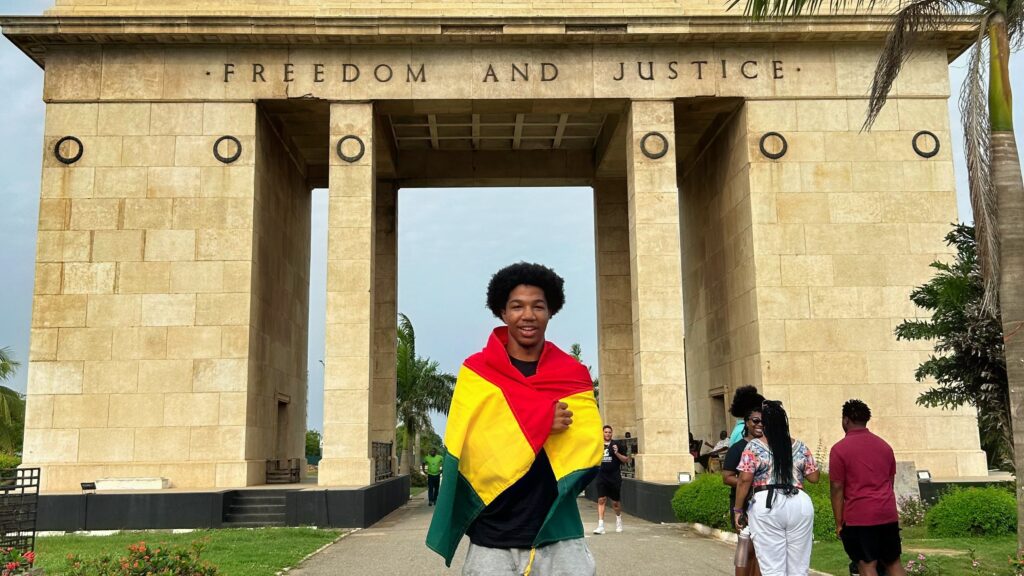Prairie View A&M University Student Bryson Stokes Reflects on Study Tour to Ghana
Studying abroad is one of the best ways to apply classroom learning, acquire international perspectives, and discover career pathways. Each year, approximately 300,000 U.S. college students opt to take their studies abroad to unlock these opportunities. One of them is Bryson Stokes, a senior nutrition major at Prairie View A&M University who embarked on his very first study abroad trip last summer. He shares how the two-week study tour to Ghana enhanced his studies, and how he hopes to apply the international educational experience to his career.
What interested you in participating in the LFW Fellowship program?
My mentor, Quincy Moore, thought I would be a good fit for the program, and that I could represent Prairie View A&M University well, so he nominated me. What initially attracted me to the LFW Fellowship was the destination, Ghana. But once I learned about the program’s principles of commitment, communication, service, self-awareness, global-mindedness, and leadership, I could not let the opportunity pass me by.
What did you learn about nutrition and food during LFW’s study tour to Ghana?
LFW’s Fellowship to Ghana served as a confirmation for me. I knew I loved studying food and nutrition, but being able to add value in a space with other fellows and mentors made me feel special—like I, specifically, had something to offer to this field and the world. At each meal, I shared nutritional information about the food, which confirmed my passion for nutrition education.
Academically, I felt very gratified and inspired to go as far as I could with my passion. Since coming back to the United States, I have been eager to solidify my post-graduate future in the nutrition space. I learned how to recognize spaces for me as a professional and confirm the importance of knowledge sharing.
How do you plan to apply what you’ve learned to make an impact in your community?
Upon returning to the States, I began to actively share my story with my friends and family, sharing gifts and anecdotes about anything that reminded me of my study tour to Ghana. I have challenged myself to practice gratitude and share it with my friends by requiring everyone who comes to my office to share three things they’re grateful for.
I think that everyone can take and give. In the United States, there are areas with food insecurity, but we mirror some communities abroad in terms of the food that we produce. For example, in Accra, Ghana, grains and fish are produced and consumed a lot and because of that, chronic diseases are less prevalent among the people there. Here in the U.S., we can potentially reduce chronic disease by making the most out of what we have and what’s available to us.
Was there a specific moment during this trip that significantly impacted you? What lessons or insights have you gained from it?
In Kumasi, we were introduced to the Tetrfu School of Technology. The connection between Leaders of the Free World, Culture Beyond Borders, and Tetrfu School of Technology is a man named Ato. Ato was our tour guide throughout most of the study tour. When he is not being a gracious host, he works at Tetrfu as a teacher.
Ato invited the LFW group to his school to show us the culture of education, dance, and community in a rural setting. The ask from Tetrfu was simple: help to rebuild the kitchen that had been destroyed in a rainstorm. One of the unique pillars of LWF Fellowship were the service-learning opportunities they found for us in each city. I was very excited to serve.
Preparing for the day, we were advised to wear gloves and sunscreen and work within our range. I was no stranger to hard work and was thoroughly accustomed to the Ghanaian heat because it had nothing on Texas humidity. As I learned how to mix mortar and carry bricks, I felt good. Then, I learned how to lay the bricks and mortar in rows. It was enjoyable. I felt very manly and noble. Soon, however, my time was up, and I let one of the other fellows take my place, laying the bricks so I could take a water break. Suddenly, he was done laying bricks, and many of us were just standing around and talking with the kids and teachers. I found myself looking for work and feeling impatient. I wanted to keep helping even though the work for the day was done.
It was only during a reflection section led by Venida, one of the mentors, that I unpacked where my attitudes toward hard work came from. I do not have to work incessantly to be valuable; however, I should be swift and intentional when I do work. After sitting with my feeling of shame for thinking we as a group were underperforming after finishing the day’s work, I have begun taking the steps to unpack and unlearn “the invisible tax” often placed on and internalized by Black Americans specifically.
What insight or advice would you give your peers about international education experiences?
Growing up in Pearland, Texas, I always wanted to make it out. Not because I was less fortunate but because I didn’t always see my place there or feel supported by many people. I could think of nothing special that came from Pearland that made other Black kids excited about themselves or imprinted on them that they could be whoever they wanted to be, so I tried to get out as soon as I could. As I’ve matured, I realize that it is more important to address the issues in your own community rather than flee elsewhere and adopt the issues of another city.
